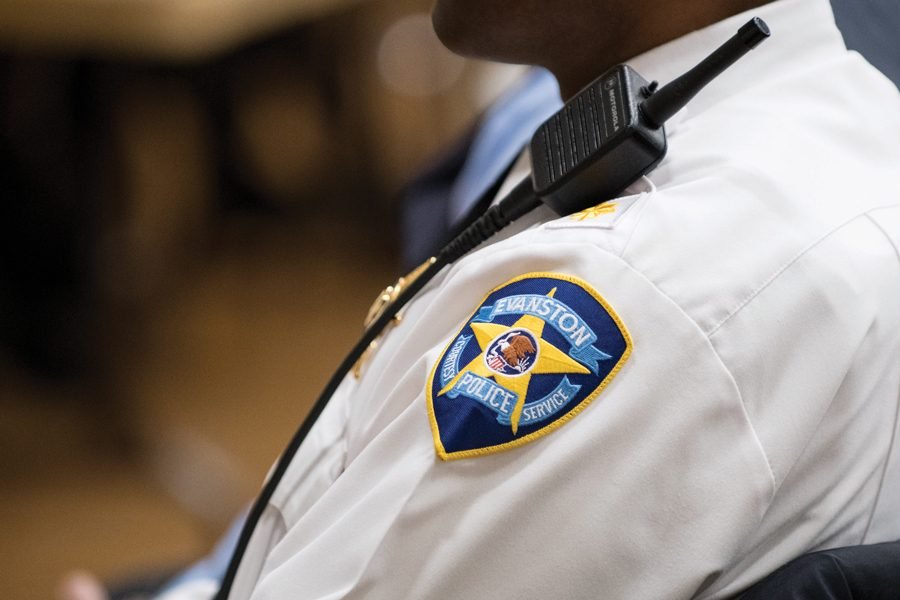Mayor holds Q&A on alternatives to policing in Evanston
Daily file photo by Colin Boyle
An EPD officer. An EPD officer allegedly commented on the DefundEPD Instagram account in opposition to the Black Lives Matter movement.
August 24, 2020
Mayor Steve Hagerty, Police Chief Demitrous Cook and representatives from other cities discussed alternative policing practices during the penultimate event in the city’s weekly policing Q&A series on Monday.
Evanston Police Department has established connections with various local nonprofit organizations, such as Connections for the Homeless and the local YWCA, Cook said. Organizations collaborate with EPD for specific needs, such as housing assistance and domestic violence support. However, EPD is most frequently the first response to these calls, and brings in other organizations later on.
In Colorado, the Mental Health Center of Denver partners with the Denver Police Department, and is involved in responses to 911 calls, Chris Richarson, the center’s program manager, said. Operators can request for a local social worker and paramedic to respond to situations instead of Denver police officers.
Recently, the Mental Health Center of Denver also allows for ride-along social workers, who partner with officers on patrol and work to respond to situations they may be better equipped to deal with. Richardson said the pilot program, which has run for nearly three months, has responded to around 350 calls.
“Not one of those (calls) has led to us having to key up requesting police backup,” Richardson said. “We’ve been able to resolve them on-scene, and if we needed something like an ambulance, we were able to specifically request an ambulance.”
Richardson said the partnership has allowed mental health professionals to handle difficult situations appropriately, and now DPD officers often call for social workers as backup.
In Olympia, Washington, policing also relies on mental health support workers to de-escalate situations police officers may not be equipped to deal with. Anne Larsen, Olympia Police Department’s outreach services coordinator, said in 2017, a public safety levee allowed OPD to create a crisis response unit. As a result, teams of mental health professionals patrol Olympia in a van from 7 a.m. to 9 p.m. daily.
“If they see somebody having a bad day or in distress, or if they helped somebody the other day… and they swing by and check in on them. A lot of what we do is self-initiated,” Larsen said. “You really want to prevent someone from calling 911 to begin with… It frees up our officers to do law enforcement work, and it frees up our team to really engage in the community and help them.”
The panel served as an opportunity for community members and leaders to hear about successful programs in other cities across the nation, Hagerty said. Evanston has researched methods of alternative policing and citizen safety, he said, and is following “best practices” based on recommendations given to city officials.
However, he said the city will continue to evaluate its next steps as EPD works to find ways it can best serve the Evanston community.
“We’re not alone — there’s many cities out there taking a hard look at what’s the best way to manage mental health issues in the community and homelessness issues in the community,” Hagerty said. “Our police chief and the chief deputies… are very committed to a full examination of this while we figure out what’s best for Evanston.”
Email: jacobfulton2023@u.northwestern.edu
Twitter: @jacobnfulton
Related stories:
— Citizens Police Review Commission examines citizen complaint process in first meeting



